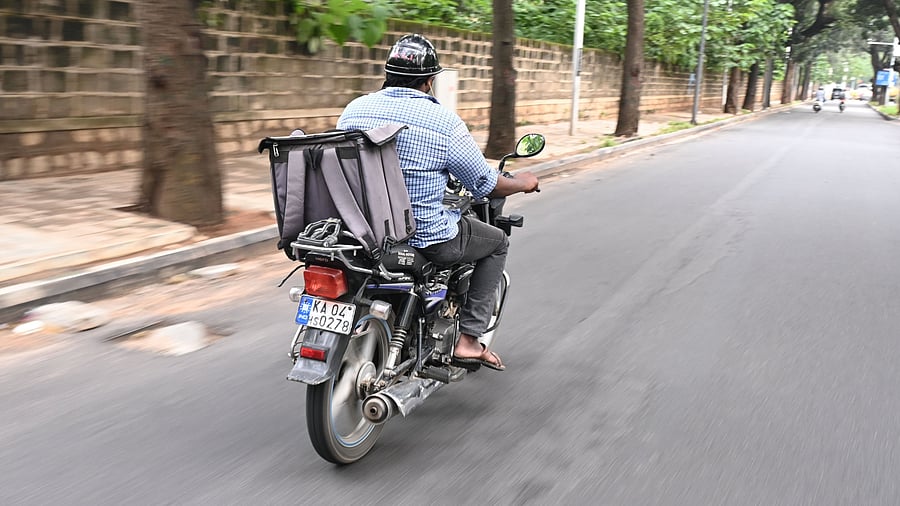
Representative image of a quick commerce delivery.
Credit: DH File Photo
India once gathered around a single screen called Doordarshan. It was a monopoly, and available only for a few hours daily, slow and grainy, State-run and limited, yet it stitched the imagination of an entire nation together.
Today, the word door has changed its meaning. What once meant ‘distance’ has now become the threshold of our homes. Groceries, phones, medicines, and even temple blessings arrive in minutes. Technology has collapsed distance into doorstep. Yet the things that matter most to a citizen’s dignity and democracy seem delayed or even out of reach.
We live in a world where the idea of distance has collapsed. The first ‘door’ in Doordarshan meant remoteness. The second ‘door’ of our current times is the one that marks the threshold of our homes. The arc from distance to doorstep captures the astonishing leap that technology has made in shaping everyday life.
Groceries appear within 10 minutes. Pizza is guaranteed in 30. New phones, medicines, and household items arrive before we can change our minds about ordering them. Live darshan from famous temples is streamed instantly to our screens. Even political debates and celebrity gossip arrive before their subjects have time to catch their breath.
We have built an ecosystem where speed has become the most visible marker of modernity. The commercial sector has redefined the citizen into a consumer whose time is constantly courted. Speed has become a competitive advantage and a cultural expectation.
Yet, in the same India, when an ambulance is sought, it can take longer to arrive than a pizza delivery. This imbalance is most visible not only in courts or hospitals, but in the daily fabric of our lives. We are told our cities are richer than ever, their municipal budgets running into thousands of crores. Yet citizens stumble over potholes that never seem to get repaired, choke on polluted air, and struggle with public transport that lurches between inadequate and unsafe.
We have learnt to navigate broken roads and overflowing drains as if they are an unchangeable fact of life. While everyone whispers about corruption, we continue to pretend that it does not exist, or worse, that it cannot be challenged. Here too, urgency is absent, except when it comes to collecting taxes or tolls.
When citizens seek factual and unbiased news, they encounter commentary dressed as truth and debates shaped for provocation rather than clarity. When ordinary people look to the judicial system for protection and justice, they often wait not for minutes or hours but for years and decades.
This is the misplaced urgency amidst ourselves. Urgency has been reserved for what markets can monetise. Patience has been demanded for what democracy should guarantee. The contrast is not accidental. Technology has been deployed to accelerate commerce because commerce rewards it. A 10-minute grocery delivery wins a customer. A 30-minute pizza creates loyalty. A trending clip on social media ensures advertising revenue. Urgency here has a direct return.
The same energy is missing where there is no immediate profit. Reliable emergency healthcare requires investment and co-ordination. Fair and swift justice demands deep reform. Fact-based journalism requires independence and courage. None of these can be delivered by algorithms alone. They require societal will and political priority.
As a result, our habits have been rewired. We have grown used to impatience in consumption and resignation in citizenship. We demand refunds if a parcel is delayed by an hour, yet we quietly tolerate years of pending court cases. We complain if an app is slow to load, yet we shrug when a government service keeps us waiting. We expect instant blessings from temples on our screens, but accept long delays in blessings of dignity and fairness.
The danger is that we begin to internalise this imbalance. We measure modernity by the speed of delivery rather than by the reliability of systems that protect life and liberty. This imbalance is not sustainable. A nation’s resilience cannot rest only on the shoulders of commerce. The strength of a society is measured by how quickly it can respond to the needs of its most vulnerable members. Technology is only as meaningful as the values that guide its application.
The lesson from our journey from Doordarshan to ‘door-darshan’ is not just about screens and services. It is about the priorities we set as a people. Doordarshan once symbolised patience. Families waited for weekly shows. News was broadcast at fixed times. Events were mediated through a single channel. That patience was both a limitation and a discipline.
Doorstep darshan today symbolises instant gratification. We expect the world to appear in our hands in real time. That impatience is both an achievement and a trap.
What we need is a recalibration. Urgency must be demanded of governance, public services, and institutions of democracy. The courts must be as swift as a food delivery app. Emergency medical care must be as reliable as a streaming service. Journalism must be as accessible as social media yet far more credible.
We need a collective awakening to the places where urgency is vital. Fairness must be urgent. Safety must be urgent. Truth must be urgent. Democracy itself must be urgent. Everything else can wait.
As we stand at our doors today, receiving endless deliveries of products and content, it is worth asking ourselves what is still waiting outside, unable to reach us. The answer to that question will define the next phase of India’s progress.
India has already mastered the convenience of technology. Can we master the urgency of citizenship? From Doordarshan to ‘door-darshan’, the journey has been extraordinary. The future will be defined by whether democracy itself arrives on time.
Srinath Sridharan is a corporate adviser and independent director on corporate boards. X: @ssmumbai.
Disclaimer: The views expressed above are the author's own. They do not necessarily reflect the views of DH.